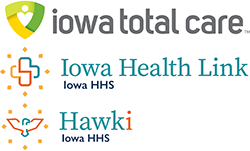HEDIS
HEDIS® (Healthcare Effectiveness Data and Information Set)
HEDIS is a set of standardized performance measures developed by the National Committee for Quality Assurance (NCQA) which allows comparison across health plans. Through HEDIS, NCQA holds Iowa Total Care accountable for the timeliness and quality of healthcare services (acute, preventive, mental health, etc.) delivered to its diverse membership.
Use of HEDIS Scores
As both state and federal governments move toward a healthcare industry that is driven by quality, HEDIS rates are becoming more and more important to both health plans and individuals. State purchasers of healthcare use the aggregated HEDIS rates to evaluate the effectiveness of a health insurance company’s preventive health outreach efforts. Physician specific scores are being used as evidence of preventive care and appropriate treatment from primary care office practices. These rates then serve as a basis for physician profiling and incentive programs.
Calculating HEDIS Rates
HEDIS rates can be calculated in two ways: administrative data or hybrid data. Administrative data consists of claim or encounter data submitted to the health plan. Measures typically calculated using administrative data include: annual mammogram, annual chlamydia screening, routine Pap test, appropriate treatment of pharyngitis, appropriate treatment of URI, appropriate treatment of asthma, antidepressant medication management, access to PCP services, and utilization of acute and mental health services. Hybrid data consists of both administrative data and a sample of medical record data. Hybrid data requires review of a random sample of member medical records to abstract data for services rendered but that were not reported to the health plan through claims/encounter data. Accurate and timely claim/encounter data reduces the necessity of medical record review. Measures typically requiring medical record review include: comprehensive diabetes care, control of high-blood pressure, immunizations, prenatal care, and well-child care.
Annual Medical Record Reviews (MRR) for HEDIS?
MRR audits for HEDIS are usually conducted February through May each year. Iowa Total Care QM representatives, or a national MRR vendor contracted to conduct the HEDIS MRR on Iowa Total Care’s behalf may contact you if any of your patients are selected in the HEDIS samples. Your prompt cooperation with the representative is greatly needed and appreciated.
As a reminder, PHI that is used or disclosed for purposes of treatment, payment or healthcare operations is permitted by HIPAA Privacy Rules (45 CFR 164.506) and does not require consent or authorization from the member. The MRR vendor will sign a HIPAA-compliant Business Associate Agreement with Iowa Total Care which allows them to collect PHI on our behalf.
How to Improve HEDIS Scores
- Understand the specifications established for each HEDIS measure.
- Submit claim/encounter data for each and every service rendered. All providers must bill or report by encounter submission for services delivered, regardless of contract status. Claim/encounter data is the most clean and efficient way to report HEDIS. If services are not billed or not billed accurately they are not included in the calculation. Accurate and timely submission of claim/encounter data will positively reduce the number of medical record reviews required for HEDIS rate calculation.
- Ensure chart documentation reflects all services provided.
- Bill CPT® II codes related to HEDIS measures such as, body mass index (BMI) calculations, eye exam results and blood pressure readings.
If you have any questions, comments, or concerns related to the annual HEDIS project or the MRRs, please contact the Quality Department.
HEDIS and HIPAA
As a reminder, protected health information (PHI) that is used or disclosed for purposes of treatment, payment or healthcare operations is permitted by HIPAA Privacy Rules (45 CFR 164.506) and does not require consent or authorization from the member/patient. The medical record review staff and/or vendor will have a signed HIPAA-compliant Business Associate Agreement.

